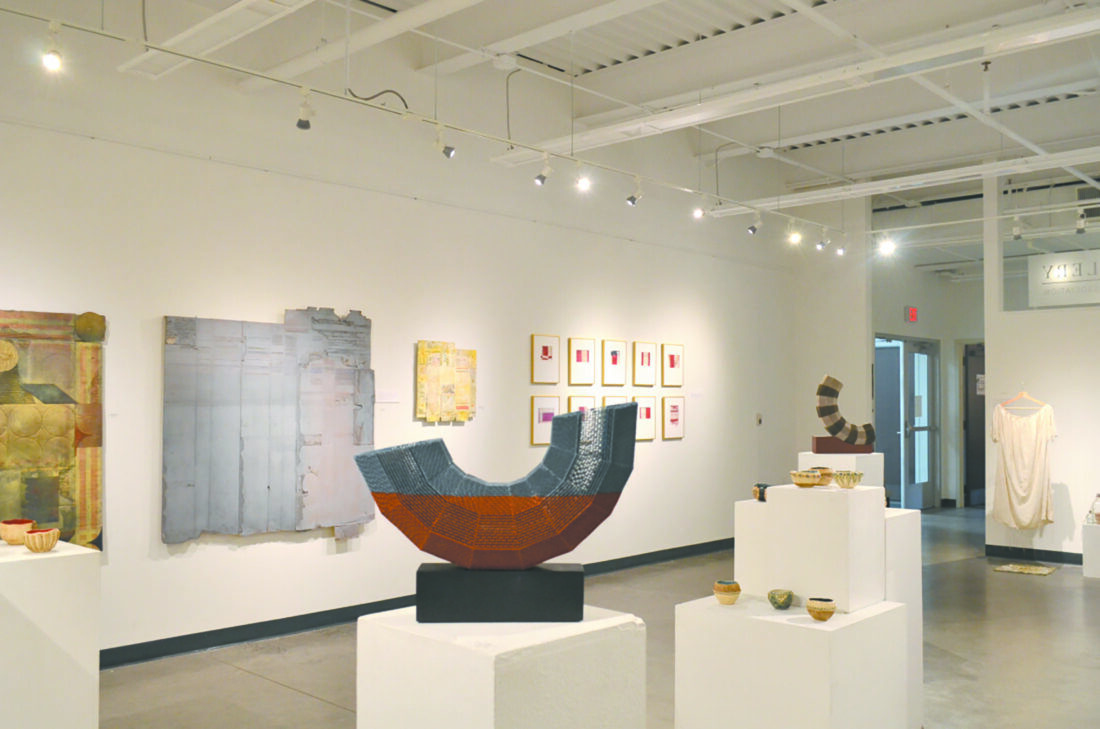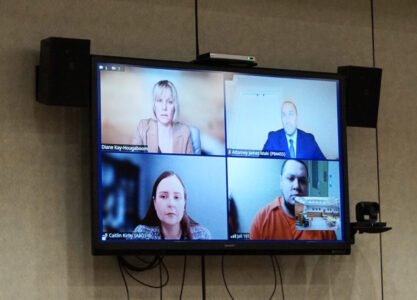An uneasy feeling
State House approves cuts to arts

Journal photo by Abby LaForest Art displays in the Peter White Public Library, such as the Umbilios show by the Sensoria Artist Collective that’s currently in the Deo Gallery, have supplementary funding sources in order to continue in the wake of proposed MACC cuts. However, other arts and culture organizations may not be so fortunate.
MARQUETTE — Within the series of budget cuts that the Michigan House of Representatives approved in their proposed budget last week, local arts and culture organizations may face losing some of their funding.
The Michigan Arts and Culture Council’s Arts and Cultural Grant Program is proposed to face severe cuts in the House’s proposed substitute to House Bill 4706 (H-1), a draft of the budget for the 2025-26 fiscal year. The current requirements of state government the grant program are:
• Item One: Requires the Michigan Arts and Culture Council to administer an arts and cultural grant program that maintains an equitable geographic distribution of funding and utilizes past arts and cultural grant programs as a guideline; requires council to publish application criteria; authorizes the council to charge a non-refundable application fee, appropriated for expenses necessary to administer the programs; and requires a report to the legislature on awards.
• Item Two: Allows up to three percent of the arts and cultural appropriation to be expended for program administration.
• Item Three: Requires $250,000 from the arts and cultural program appropriation to be awarded to the Michigan Traditional Arts Program at Michigan State University.
• Item Four: Requires one million dollars from the arts and cultural program appropriation to be awarded to the Concert of Colors.
According to the new proposed budget that was approved by the House last week, “Executive revises to delete items two, three, and four. Senate revises to reduce the cap under item two to one percent, strike items three and four, and include new language allocating one million (dollars) to a cultural exchange network for a free music and arts festival.”
The potential cause for concern is how these cuts could negatively impact arts and cultural organizations in Marquette County and the Upper Peninsula. Organizations across the county received a total of $248,012 in FY24 and $342,408 in FY25 in funding across 26 organizations in the county, with MACC awardees in the City of Marquette making up approximately 94% of the awardees in FY24 and approximately 95% in FY25. According to Tiina Morin, the Arts & Culture Manager for the City of Marquette, this funding support is what keeps the doors of some institutions open.
“These funds aren’t just about keeping the lights on, they directly support essential programming, especially for our youth and seniors. They bring festivals of all kinds, theater, music and art instruction to children and seniors, public art, teach history and preserve traditional art forms,” wrote Morin in a message to the Mining Journal. “At a time when arts and culture funding is being slashed at the federal level, it’s unthinkable that the State would follow suit. These institutions already operate on razor-thin budgets and often rely on outside donations to survive. Cutting their primary source of public funding will put them and the communities they serve at risk. Especially our most vulnerable.”
Andrea Ingmire, Director of the Peter White Public Library, explained how her organization could be affected by the proposed MACC cuts that have been approved by the State House. “Last year was the first year we got that funding, and we applied for it because the City of Marquette Arts & Culture Center is moving out (of the library.) So we were like, ‘Oh, this is a great way that we could supplement some of the money that we have been getting from rental services from MACC to provide art programming here at the library after they leave,” said Ingmire. “When we applied for it, the intention was to help offset that loss of revenue, so this year (it) was used to fund the public gallery program. The Deo Gallery and the Huron Mountain Club Gallery, we pay for professional installation of those exhibits, so artists bring in their work and then we have a technician who comes in and actually does all the hanging, which is definitely something that everyone wants to have happen. They do not want me to do it. It just creates the more professional exhibit experience for the artists who have their work in the galleries”
Peggy Frazier, President of the Lake Superior Theater, explained that the skills learned in arts and culture endeavors are also useful in other areas of life. “We could spend pages sharing why theater is so important to our lives and those of our little ones, because Theatre teaches empathy, collaboration, and courage. Theatre programs produce not only great performers but also better citizens and workers. Even our littlest ones these days spend a lot of time on our screens. Those that spend time in live theater find that it is the last unmuted voice in a world that is full of one way conversations and/ or angry noise. A young person in a rehearsal room learns that you don’t win an argument by volume – it is by defining your objectives and tailoring your tactics to your audience and most of all by listening,” wrote Frazier in a message to the Mining Journal. “So when we found out that there was very little chance that NEA/MACC funding would not continue we were especially sad for the artistic endeavors that depend on that funding – but also for those that have not yet been created. Creations of artistic variety that teach empathy, collaboration, as well as the courage to present choices. If we are now in a world (where) machines can imitate our voices we must step up and speak up with our own voices honestly.”
Frazier went on to say how LST has “live theatre for all” as its mission, and that the boathouse where their performances take place is for the entire community, not just those who can afford to take trips out of town to see live performances.
“LST, like other art forms, generates economic activity that keep our Downtowns alive while making our communities a great place to live, work, and play. LST will continue. Are our prices going to be affordable? Will we be able to replace our aging equipment without Grant support?
We are fortunate to have volunteer administrative staff & a place to perform unlike others. And we are incredibly grateful to our sponsors and (our) donors who have made it possible for us to fill the Boathouse with magic for 27 years,” wrote Frazier. “Let’s do this! Contact your legislators & make a donation today. See you at the Boathouse!”






